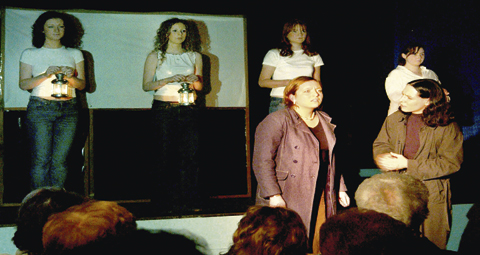September 28 | ![]() 0 COMMENTS
0 COMMENTS ![]() print
print

At your service: How art plays a crucial, social function
In a new monthly feature on The Arts, we hear from Stephen Callaghan, creative director of the Archdiocese of Glasgow Arts Project, on how art can be an exceptional social service in favour of the common good
When you look around you, do you think of art as an exceptional social service in favour of the common good? This is exactly how Blessed Pope John Paul II described the vocation of the artist. In a society in which we are bombarded by the saturation of images and sounds, can the Catholic artist really have an impact on society for the good of all?
Art is a social service because it answers a basic human need to understand the human condition in all its facets, through expression. As Christians, believing in the incarnation of God in the person of Jesus Christ, we have a unique understanding of humanity, as something beautiful and redeemed. We have a responsibility, as artists and as consumers of art, to express this understanding. These days, the boundaries of what constitutes art are forever shifting. In the 20th century, film was at the forefront of this debate, before that, photography, and today, we hear of digital artists. Whatever the medium used, art is fundamental to the exploration of what it means to be human and this serves the common good.
Today, freedom of expression has never been such a contentious issue. It is often said that people today are ‘un-shockable’ as there are fewer and fewer social taboos when it comes to the arts. Perhaps today, one of the most controversial things that one can be in the arts world is Catholic. Pope Benedict XVI, at Bellahouston Park, reminded us that ‘religion is in fact a guarantee of authentic liberty and respect, leading us to look upon every person as a brother or sister.’ What we are offering is something attractive because of its beauty and goodness so why are so many threatened by it?
Catholic artists need to be confident that they are offering salvation through their work. One of the reasons why AGAP was founded was to provide a framework of solidarity for those wishing to contribute to the cultural life of the Church in Glasgow and there are many who have done so since. So often we are vulnerable. I know, from personal experience, what it feels like to pray for strength to confront a theatre company with the news that I could not work on a production because of its anti-Catholic content. We need to work for change.
Can art really affect social change? I have reason to believe that the answer is yes. When any regime wants to control a society, it first of all tries to harness the power of its culture. In Nazi-occupied Poland, the young student of Philology, Karol Wojtyla, who would later become Pope John Paul II, witnessed the closure of the university where he was studying, the assassination of Polish intellectuals and the closure of the theatres. As a young actor-playwright, taking part in clandestine performances of Polish classics in the drawing rooms of people’s homes, he was part of a ‘resistance through culture.’
This peaceful means of resistance kept alive the culture of the Polish people in the face of totalitarian oppression at the risk of being caught and punished. Today, we face a different kind of oppression, and it has already seized control of our culture, dictating to us through every medium at its disposal: literature, film, theatre, visual art and music, which serve a secularist, commercial agenda, telling us to accept the unacceptable and forget about the consequences.
How do we react to this oppression? The Catholic Church in Scotland might not have at its disposal all of the tools that our opponents have. In the face of a Goliath, we are armed only with a slingshot. However, with careful aim, we can make a difference. AGAP is a tiny community arts project that survives on a shoestring budget but, as its director, I have seen firsthand the impact that it has on the lives of individuals, giving new heart to those seeking to express their Faith and encouraging new interest in the Faith. Using the tools at our disposal, we have worked with others to help articulate some of the issues that face society today and rekindle interest in the lives of the saints or in Catholic culture.
In 2010, AGAP worked with the Catholic Parliamentary Office to produce a play called Pure Dead Dangerous, which presented a ‘what if?’ scenario in relation to Margo MacDonald’s bill for euthanasia and assisted suicide.
“The arts can certainly inspire people to take action in society and provoke them to get involved in political issues,” John Deighan, Catholic Parliamentary Officer said. “I’ve had direct experience of seeing this in action especially in some of my cooperation with AGAP.”
The play was then made into a DVD for schools. AGAP has tackled a range of issues through community theatre productions, from alcohol abuse to slavery, abortion to domestic violence. This included creating a play called Freedom from Chains to tell the 80-year history of the Notre Dame Centre and its work with children, young people and families. Most recently, our production of The Martyrdom of Saint John Ogilvie, touched upon the issue of the state interfering in matters of religious freedom, which is central to today’s ‘debate’ about same-sex ‘marriage.’
Of course, there is another obvious way in which the arts can affect social change and that is when there is a direct link with a charitable cause. A painting at this year’s Lentfest, entitled The Road to Emmaus by Gerard M Burns, raised awareness of the work of Emmaus, the charity which helps homeless people through a range of projects. It was recently the focus of an event involving hostage-survivor, Sir Terry Waite.
Many of us will also be aware of the efforts of Artists for Mary’s Meals and the excellent charity concerts by the likes of opera singer and classical guitarist, Martin Aelred, or by the Spirit of Life Youth Choir, which have raised thousands of pounds for good causes like SCIAF.
On October 13, around 300 singers and musicians from Glasgow and Edinburgh, with various backgrounds, will unite at the Bute Hall in Glasgow University to perform a charity concert of Elgar’s masterpiece, The Dream of Gerontius. Based upon Blessed John Henry Newman’s epic poem, the concert is a retirement tribute for Archbishop Emeritus Mario Conti and the proceeds will be donated to SCIAF and to Aid to Children in El Salvador. Events like these address two kinds of poverty: both the cultural poverty of our own society and economic poverty of our brothers and sisters.
Much of what AGAP does to fulfil the role of social service in favour of the common good takes place in the community, swapping the drawing rooms of Polish houses for church halls. They include film and faith clubs, concerts, plays and poetry and music cafes. We cannot afford big venues or the glamour of better-funded arts enterprises. We are vulnerable. Yet, despite our vulnerability, we throw open the doors to the wider community and invite others to join us. Our cultural resistance is kept alive by these kinds of initiatives that facilitate discussion and motivate people to action. Just as importantly, the beauty of the arts can inspire diverse people to meet on common ground.
More than ever before, there is a need for solidarity within the Catholic community and within the wider Christian community. We need to shed our cynicism, bitterness and anger, and make a positive stand. Perhaps the social service that the arts can offer is one way to confirm our Catholic identity, liberate our society from the falsehoods of cultural oppression, and empower a new cultural resistance with the conviction that Our Lord is worth the risk.











